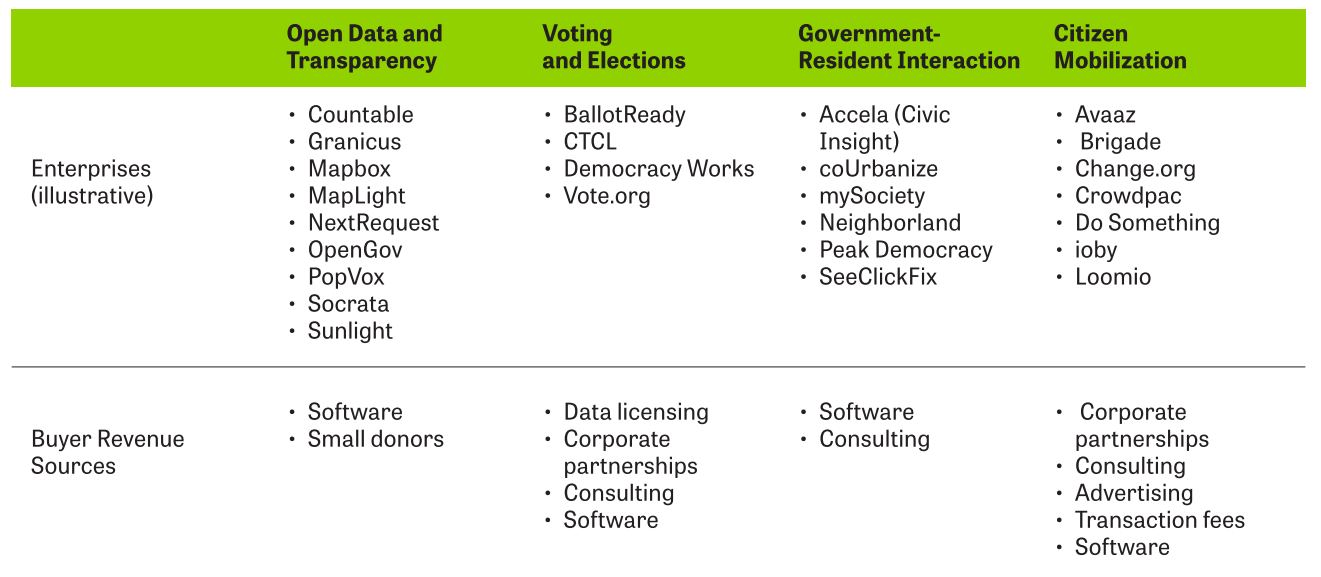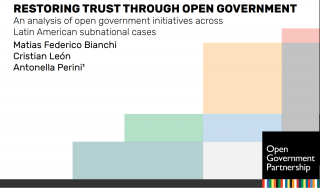I read this so you didn’t have to
I’m experimenting with formats and levels of generality to make these more readable. Read through for quick summaries of findings, methods, ideological framing, and whether you should care. Let me know if you miss the weeds.
What is it: Scaling Civic Tech: Paths to a Sustainable Future, 64pg report
Main point: Most civic tech orgs aren’t sustainable, and there is no clear single path or vision to get them there.
Findings:
- There’s not many sustainability success stories out there. But the field is young, so we might still need to wait and see.
- Civic tech orgs relate to business models in dramatically different ways. Unsurprisingly, those growing the most are for-profit orgs selling services to government or business.
- Measuring impact remains a dark art and no one is doing it well.
- There are weird imbalances in sustainability and business models. While venture capital tends to support core capacities, philanthropic funding does not, which results in more resilient for-profit orgs, while goodie-two-shoes are left in a continual scramble for project funds.
Insights:
- Distinguishes civic tech revenue streams as those from buyers (projects/services) and builders (grants/core support)
- Has a useful mapping and categorization of revenue types
- Their mapping of orgs (pg21) is interesting, though it might lead many of them to quibble with how they’re place

Shortcomings:
- The “interactive” design for the report website is mildly seizure inducing, and it took me a while to find the download link. Phew.
- There is no consideration of the conceptual and strategic intersection between sustainability and impact, which many orgs often experience as orthogonal in actual work.
- Though the recommendations offer an interesting diagnosis of the field, they are formulated at a less than useful level of generality. Admittedly, to offer recommendations to help orgs think about their own sustainability would have required more pages, but would have made this report infinitely more useful, also to the funder community.
Where’s it coming from:
This research was commissioned by the Knight Foundation and the Rita Allen Foundation. The Knight Foundation is a major player in supporting tech and journalism work, and has previously produced two important reports on civic technology’s non-profit ecosystems and civic tech business models. This last theme is very clearly continued here. Ideologically, this report is planted firmly in the perspective that civic tech should have revenue models and financial sustainability. Grant-seekers will recognize this as an increasingly common mantra since Omidyar started sucking oxygen out of the funding space nearly a decade ago. It’s also worth noting that this report is very much focused on the US civic context and the work of US-based organizations.
Methods:
Based on analysis and interviews with “nearly 50 stakeholders, including founders of for- profit and nonprofit civic tech organizations, foundations, venture capital firms and other prominent stakeholders in the field.” No description of structured analysis or potential for bias in how civic tech founders might describe sustainability to researchers hired by funders.
Should you care?
If you’re active in the civic tech scene, doing funding or networking, not much in this report will surprise you. But it’s an important insight into how sustainability is being conceptualized and expectations formed among funders. If you are going to be sending a grant application to Knight, Omidyar or other donors in that head space, you will want to understand the logic and argumentation here. Unfortunately, however, there is little practical guidance or thought provocation to help orgs consider their own sustainability models.





